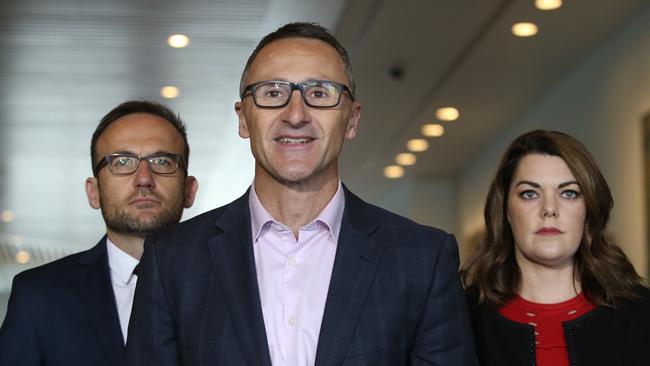Greens are lost in political wilderness and only have themselves to blame
THE future of the Greens looks bleak after last weekend’s trouncing in the Batman by-election and a steady decline in votes – and they only have themselves to blame, writes Graham Hryce.
Opinion
Don't miss out on the headlines from Opinion. Followed categories will be added to My News.
THE past few months have been bad for the Greens. In the recent Tasmanian and South Australian elections the party’s vote decreased, and last weekend it was soundly trounced by Labor in the Batman by-election – which it should have won.
Various factors have contributed to the Greens’ recent electoral decline. The party’s basic problem is that federally and in almost every state it is plagued by internal conflict.
In NSW, for example, the Greens have been split into two bitterly opposed camps for years. This has given rise to endless public spats, sackings and unseemly litigation between party officials. The leader of one of the camps, Senator Lee Rhiannon, was recently demoted in a coup from the top position on the Senate ticket for the next election.
Internal party divisions also caused the by-election loss in Batman – an inner-city Melbourne electorate not dissimilar to Maiwar in Brisbane, which the Greens won at the last Queensland election.
These internal divisions are exacerbated by the Greens’ party structure. It is superficially democratic, but important decisions tend to be imposed dictatorially from above. And, more importantly, the party lacks an institutionalised Labor-style faction system to control internal conflict.
What happened in Batman is a textbook illustration of this. There, federal Greens leader Richard Di Natale and Melbourne MP Adam Bandt endorsed Alex Bhathal as the Greens candidate, despite widespread local opposition to her. Bhathal had been the subject of numerous complaints by local party members.
Disgruntled local Greens responded to having Bhathal foisted on them by leaking damaging material about her to the media, which derailed the entire Greens campaign.
Bhathal denied any wrongdoing and was cleared by a party committee, and this week Di Natale threatened to expel the leakers from the party, thereby generating more instability.
The Greens also lack basic political judgment. Prior to the Batman by-election, Bhathal had run for elected office on five previous occasions and lost each time. She was clearly a dud candidate – and completely out of her depth against the high-profile Labor candidate, former ACTU president Ged Kearney, who was hand-picked by Bill Shorten.
No competent politician should have endorsed a candidate like Bhathal in these circumstances, but Di Natale did and, as a result, lost the by-election. This week he has refused to take any responsibility for the loss.
The Greens’ electoral appeal is also circumscribed by their ideological extremism and fanaticism.

Voters are not impressed by attacks like that made by Adam Bandt recently on former major general and now senator Jim Molan. Bandt, without a shred of evidence, accused Molan of having committed war crimes in Afghanistan. His attack was nothing short of disgraceful, but it was very revealing of the basic Greens mindset.
And this week, Di Natale callously asserted that the bushfires in Victoria and NSW, as well as Cyclone Marcus, had been caused by “global warming”. Most voters know this is nonsense, and they also know that it is Green opposition to back burning and land clearing that increases the risk of bushfires.
In their fanatical commitment to climate change, they are firmly committed to abolishing the entire coal industry, notwithstanding the dire consequences for all Australians. And in campaigning for so-called “animal rights”, the Greens place the welfare of animals above that of humans.
They are willing to shut down entire industries, such as greyhound racing and the live meat trade, without any concern for the thousands of people adversely affected by such decisions. They are willing to sacrifice the jobs of ordinary workers and generate higher energy prices.
The truth is, the Greens’ preference for ideological purity results in none of their policies enjoying widespread support. It follows that the Greens will only ever appeal to a small percentage of the electorate, and we should not forget that it is only through patently undemocratic political structures, like the Senate and state upper houses, that the Greens can attain any political power at all.
Unfortunately for the Greens, their recent electoral setbacks appear to have intensified the bickering within the party.
This week there have been calls for Di Natale to resign, with senior West Australian Greens figure Grahame Bowland accusing him of inflicting “untold cultural damage” on the party by pursuing “explicitly centrist” policies.
More worrying is the fact that, if the current decline in the Greens’ political fortunes continues, they face losing senators in South Australia, Queensland, Western Australia and NSW in the long term. Such a prospect is hardly a recipe for stability. The future of the Greens looks rather bleak, but the fact is, they only have themselves to blame.
Graham Hryce is a journalist and commentator


